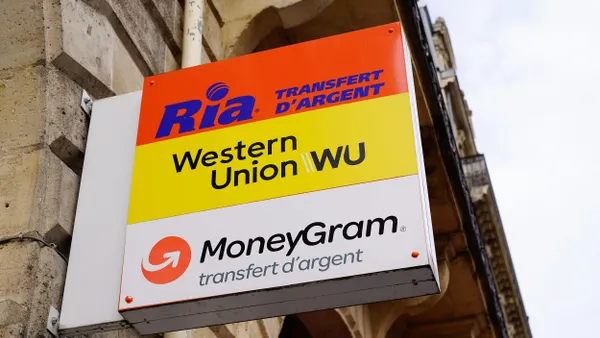Dive Brief:
- Credit and debit card giant Visa invested in cross-border payment provider Remitly and extended a service partnership with the Seattle-based fintech to continue their joint international money transfer service, according to a press release Tuesday.
- Remitly, which provides a phone app that lets users send money to people in other countries, plans to use the capital to accelerate expansion of its money transfer network. It markets its services to immigrants, seeking to disrupt the $600 billion "remittances" market with its mobile-first technology.
- Since Remitly was founded in 2011, it has attracted about $400 million in investments from at least a dozen investors, including Generation Investment Management, Stripes and Bezos Expeditions.
Dive Insight:
Visa and Remitly first partnered in 2019 when Remitly connected its money transfer services to the Visa Direct real-time "push payments platform." At that time, payments using their joint services could be sent to "multiple countries," but now Remitly says its payments can be received at Visa Direct eligible institutions in some 43 countries.
This is Visa's first investment in Remitly. A Remitly spokesperson declined to comment on how much money Visa invested or what size stake it purchased. Visa didn't respond to a request for comment.
Consumers in the U.S. can use Remitly to send payments to about twice as many countries as was possible through the company at the start of 2020, the company said in its press release Tuesday announcing the new link to Visa.
"Over the last two years, our partnership with Visa and integration of Visa Direct, has bolstered our cross-border money transfer network and provided our customers with even more options to send and receive money all over the world," said Remitly CEO Matt Oppenheimer said in the Tuesday release.
Overall, Remitly provides cross-border money transfers from 17 sending countries, with receipt possible in some 100 counties. The transfers are made to bank accounts, physical debit cards, cash pick-up locations, mobile wallets, or recipients' doors, Remitly said in a statement responding to questions from Payments Dive.
A spokeswoman for Remitly declined to specify the cost of the services, other than to say they vary, depending on the countries, currencies, and amounts involved, among other factors. Using the company’s online fee calculator for ten random examples for sending money from the U.S. to different countries, the fees most frequently were $3.99, but in two cases there was no fee and in one case it was $18.99, yielding a charge up to 8% of the amount sent.
While Remitly's "vision is to transform the lives of immigrants and their families," the service is not limited in any way to immigrants, the company said in the statement. "Remitly's customers and their recipents care about speed, and through its partnership with Visa and Visa Direct, Remitly enables its customers to quickly send funds to their loved ones," the statement said.
Visa and Remitly face competition from other big tech companies, including Google Pay, which recently said its enabling peer-to-peer payments from people in the U.S. to Singapore and India, through a partnership with Western Union and Wise.
Despite the race to add service, the World Bank estimated that such payments by migrant workers declined last year in the wake of the COVID-19 pandemic because of weaker economic conditions and lower employment, among other factors.
Clarification: The story was updated to clarify prior Remitly comments regarding transfers and fees. The update also adds information regarding fees.













